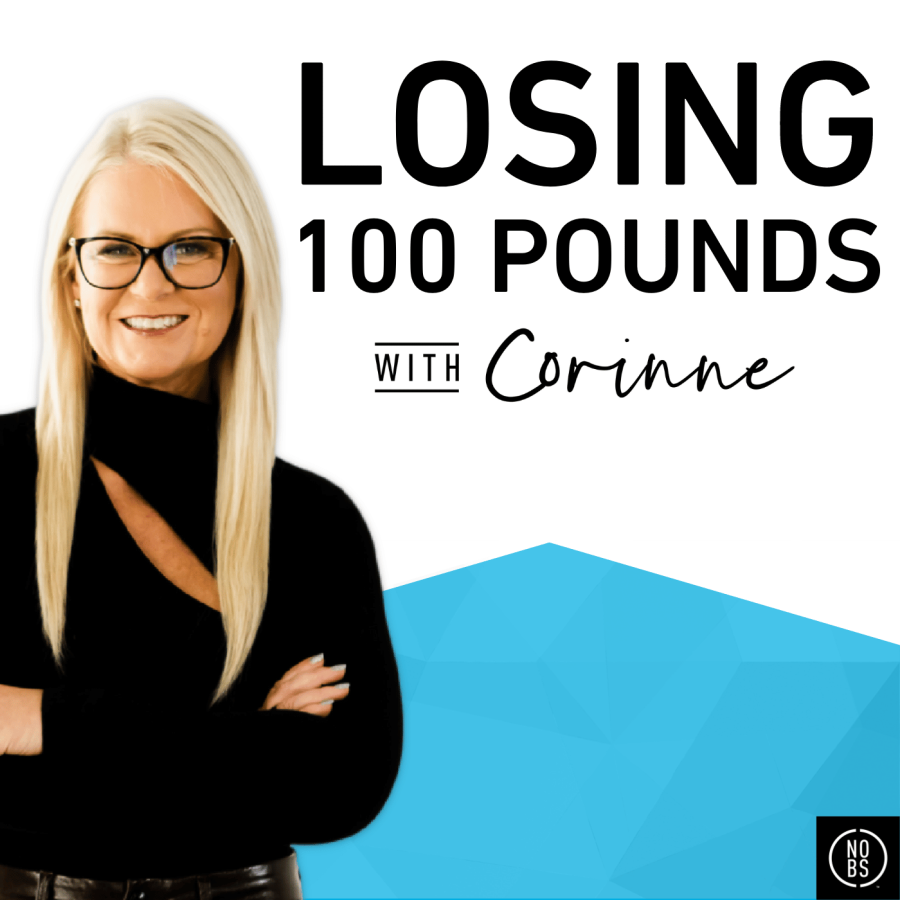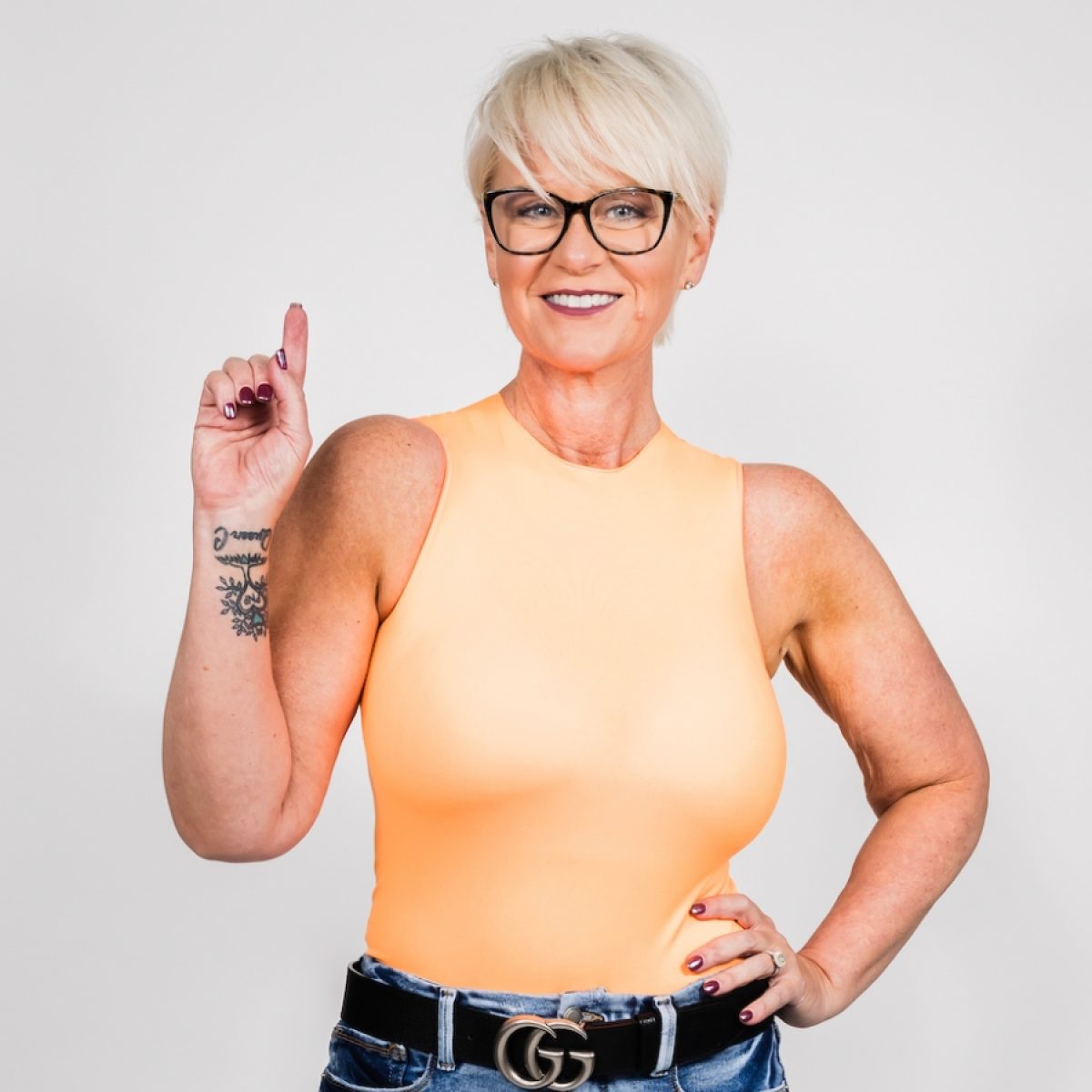Corinne:
Hi. I’m Corinne. After a lifetime of obesity, being bullied for being the fattest kid in the class, and losing and gaining weight like it was my job, I finally got my shit together and I lost 100 pounds.
Corinne:
Each week, I’ll teach you no bullshit weight loss advice you can use to overcome your battle with weight. I keep it simple. You’ll learn how to quit eating and thinking like an asshole. You stop that, and weight loss becomes easy. My goal is to help you lose weight the way you want to live your life. If you are ready to figure out weight loss, then let’s go.
Corinne:
Hey. I wanted to talk to you guys about terribly worded questions and how we all ask them. One of the things that I notice a lot of us doing, I do the same thing, is we will sit around and we will think terrible questions. Let me give you an example. If you sit around and think, “Why can’t I lose weight? Why can’t I stay on plan? Why can’t I figure out my body’s signals?” Anything that starts out with “why can’t I”, is always a red flag of what’s called the terribly worded question. So I want you to think about this. There is never going to be an answer to that question from your brain that’s going to help you move forward.
Corinne:
This is the problem. That question is looking for all the reasons basically why you’re inept and what’s wrong with you. And the double-edged sword of this one is that most of us, if you ask that question, the answers are based in our self concept. So even if you ask those questions, you’re not going to go back to your data and be like, “All right, so why can’t I lose weight this month? Let me go to my data. Let me dissect everything. Let me see what makes sense.” That’s not how we do it. We make it personal.
Corinne:
That question begs you to answer with things like, “Well, it’s because you’ve always failed. Well, it’s because you get no support. Well, it’s because you’re a lazy fucker.” That’s the kind of answers that that question begs. But a lot of us, we sit around and we think about it. We actually ask in the Facebook group. We journal on it, and we don’t realize that part of our problem, the reason why we’re not doing things, is simply because we’re engineering a question that’s never going to get us anywhere.
Corinne:
Now, if you were to come to me and say, “Corinne, I would really like to know all the reasons why I’m not sticking to my plan,” and I broke down like, “All right. Well, tell me about this meal, and tell me about this meal. What were your thoughts on this? And blah, blah, blah.” If you had me guiding you personally, you would be using my brain, which is going to look at things factually, it’s going to look at data, it’s going to not make it personal. I’m not going to be sitting there going, “Well, I’ll tell you, Lisa. It’s because, looking at you, you must be a lazy fucker.” That’s the way our brain will interpret things, but my brain doesn’t do that because my brain is not emotionally invested like yours.
Corinne:
I would suggest no one use those questions at all. The harder road to overcome is to take a poorly worded question, trigger all of your self-loathing, all of your self-judgment, write all that down, then figure out how you want to think about it, then answer the question in a way that helps you. I mean, that’s the hard road. So what I suggest is that you first get very aware when you’re asking those questions. Our job is not to make the questions go away. Our job is not to wish them away, think that they’re going to tear us apart, think that they are like, “Oh my God, here I am asking that question again. I must be broken. I’ll never lose weight if I keep doing this.”
Corinne:
No. Your job is just get aware when your brain does it and say, “Oh, I now know that’s just a poorly worded question.” Boring and simple. That’s always step one. In everything, when we are catching old shitties, step one is always hear it, then don’t judge it, and don’t wish it away. You will release so much emotional energy when you do that. We just want to notice when our brains are wanting to do it, when you’re trying to type in to ask coaches, when you’re posting a Facebook post, notice when you’re doing it, and then just say, “Oh, what could I be asking myself?”
Corinne:
Let’s say you were thinking, “Why can’t I stay on plan?” A better question would be literally to put your brain to work on, “Okay, I’ve noticed I’ve not been on plan. What kind of plan do I want to create for myself that allows me to eat the things I love and want, plus stay so aware that I could lose weight?” That’s a good question. That’s a solved question. That’s like presenting a question that looks at what’s not happening and generates ideas around all the things.
Corinne:
Now, that doesn’t mean that that question will be easily answered, but you don’t need it to be easily answered. You want your brain to have to mull it over. You want your brain to have to think. You want your brain to go, “Screw it. What? We’re not self-loathing? You mean we’re actually going to fucking problem solve?” Talk about a breath of fresh air. So you start looking at things like that when you think about, “Will I ever be able to lose weight?” Don’t ask that question. I mean, the answer is, of course, yes, but what is your brain thinking? No for these reasons. But it’s like the weight loss, when you just do some simple things happen. The only thing blocking you from doing the simple thing is some thoughts. If that’s the problem, then we just need to get better at finding our thoughts that get in our way, have better ones, along with better questions that take us forward. That’s all that has to happen in weight loss.
Corinne:
You can start thinking about, rather than, “Will I ever lose this weight?” You can start thinking of things like, “What does my future self do and think on a daily basis and that I can’t wait to experience?” Thinking about your future self, thinking… And that, guys, this doesn’t have to be the person who loses all their weight. I know some of you have 100 or 200 pounds to lose. Think about your future self who loses those first 25. What is she thinking and feeling? Because I guarantee you, it’s going to be different than what the version of you right now, who is looking at the journey is thinking and feeling. You can anchor yourself to thinking about that future self. What are they doing? What can I look forward to?
Corinne:
Here’s a great question. What kind of life do I want to build for myself, that fulfills me, I’m excited about? Think about questions like that. Such a better use of your time. When you ask better worded questions, you not only get more solutions and stuff, but I’ll tell you what else you get. You get to feel better because you’re putting your brain to work on answering questions that the answers even feel better. Then all you have to do is, if you look at your answers and you think, “I don’t know if I can do that,” then you just write about all the reasons why you can, rather than sitting and going, “Well, I don’t know if I can do that.” Give yourself… No, here’s exactly why I can. Here are the baby steps that I will take. Here are the things that I can do today. Here are the things I could do tomorrow. And I bet if I keep doing these things, that this is the life I will get.
Corinne:
Think about right now, about any of the poorly worded questions you’re asking yourself and how you can change them. And if you want, reply in this video. You’re in the Facebook group? Reply in this video with a question you’ve been asking that you catch, and you’re like, “Oh, so here’s what I’m going to actually start asking myself, so when I catch it, I’m going to remind myself to think on this question.” And write this stuff down in your journals and actually write about it. Y’all ask me all the time about journal prompts. Journal prompts are easy. Listen to the bullshit you ask yourself, turn it around into a better worded question, and you got all the journal prompts that you’re ever going to need and more. So do that.
Corinne:
I am doing this work myself. I have my own bunch of shitty questions I ask myself. A lot of times, mine are very fear-based in… The other day, I was asking myself, “What would I do if I lost Chris?” My brain just populates questions like that, and those are questions that I don’t mind answering if I’m going answer from the part of my brain that I’m going to calm down, that I could handle it. But if the best answers I have is, “Well, you’ll fall apart. You’ll be a complete shit show. You’ll probably end up losing your business and then you can’t take care of your son.” If that’s the answers, it’s not a good question to ask.
Corinne:
One of the things I’ve been thinking about when it comes to Chris is thinking more along the lines of if something should happen to Chris, what are all the ways that I will be able to care for me and Logan? Such a better worded question. Because at the end of the day, here’s what I do know. I would hurt. I would be in so much emotional pain. And my brain is trying to protect me from that, so it starts wanting to ask dumbass questions and stuff, thinking that if we do that, then maybe I won’t hurt as bad. One of the things that I’m learning is give my brain some peace, give it some certainty, allow it to think in a positive way about some of those questions.
Corinne:
I think it’s important that we all do it, because if you don’t train your brain how to ask better questions, or you don’t train your brain that when it asks a poorly worded one that you are going to ask a better question, it just keeps offering it up. And so when you do all the journaling, when you actually write out a better question and you answer the question, you will notice that your brain will not feel like it needs to repopulate a poorly worded question as often. It will get triggered sometimes when things happen in a certain way, but you will notice that once you do this work, your brain doesn’t question that stuff near as much. It starts learning that there’s new and better answers, new and better questions.
Corinne:
Thank you so much for listening today. Make sure you head on over to nobsfreecourse.com and sign up for my free weight loss training on what you need to know to start losing your weight right now. You’ll also find lots of notes and resources from our past podcasts to help you lose your weight without all the bullshit diet advice. I’ll see you next week.



